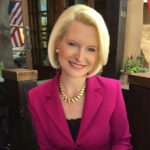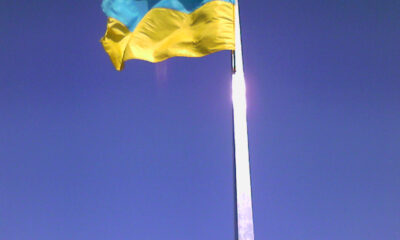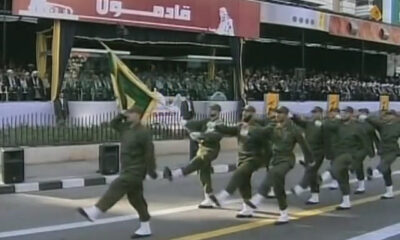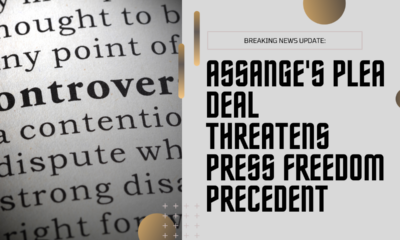Civilization
Pope Francis’s Message of Peace for the World
A summary of the annual message by Pope Francis to the world’s diplomats, surveying various theaters of war.

On Jan. 8, Pope Francis delivered his annual New Year’s address to members of the diplomatic corps. Known as the annual “State of the World” address, Pope Francis delivered his remarks in the Hall of Benedictions to diplomats from 184 countries accredited to the Holy See.
While speaking to ambassadors from around the world, the Holy Father emphasized that peace is a “responsibility incumbent upon all of us.” Peace, he said, “is primarily a gift of God…a word so simple, yet so demanding and rich in meaning.”
The Holy Father centered his annual address on “reflections on peace,” as the world is “at a moment in history when it is increasingly threatened, weakened and in part lost.”
Pope Francis pointed to numerous conflicts and humanitarian crises around the world to reiterate his concern.
For instance, Pope Francis underscored the “great numbers of innocent persons [who] were horribly wounded, tortured, and murdered, and many taken hostage” in Israel on Oct. 7. He also noted the “deaths of tens of thousands of Palestinians, mainly civilians, including many young people and children, and has caused an exceptionally grave humanitarian crisis and inconceivable suffering” as the Israel-Gaza war wages on.
The Holy Father looked east to Vladimir Putin’s war in Ukraine and asserted, “Sadly, after nearly two years of large-scale war waged by the Russian Federation against Ukraine, the greatly desired peace has not yet managed to take root in minds and hearts, despite the great numbers of victims and the massive destruction.”
Pope Francis turned his attention to sub-Saharan Africa, namely, the civil war in Sudan and the refugee crises in Cameroon, Mozambique, the Democratic Republic of the Congo, and South Sudan. According to the United Nations High Commissioner for Refugees, there are more than 18 million refugees in sub-Saharan Africa. This is the equivalent of more than 26 percent of the total population of refugees in the world.
He also pointed to various challenges in the Americas, particularly the “troubling” situation in Nicaragua, where the Ortega-Murillo regime’s crackdown against Catholics has resulted in “a protracted crisis with painful consequences for Nicaraguan society as a whole, and in particular for the Catholic Church.”
From the Middle East and Asia to Africa and the Americas, the number of conflicts and turmoil throughout the world is, according to Pope Francis, turning “a ‘third world war fought piecemeal’ into a genuine global conflict.”
Amid such conflict, the Holy Father spotlighted the often overlooked “millions of persons – men women, fathers, mothers, children – whose faces are for the most part unknown to us” that suffer in our “increasingly lacerated world.”
As Pope Francis made clear, “[M]odern wars no longer take place only on clearly defined battlefields, nor do they involve soldiers alone. In a context where it appears that the distinction between military and civil targets is no longer respected, there is no conflict that does not end up in some way indiscriminately striking the civilian population.”
While Pope Francis brought attention to these hard truths of suffering, violence, and hardship, in his address, he also offered a message of hope by outlining a path to peace.
First, the Holy Father called for respect for every human life. “At every moment of its existence,” Pope Francis declared, “human life must be preserved and defended.”
Additionally, Pope Francis said that the path to peace requires respect for human rights “in accordance with the simple yet clear formulation contained in the Universal Declaration of Human Rights” and outlines “self-evidence and commonly accepted” principles. He also noted that the “roots, the spirit and the values” that formed the foundation of post-World War II multilateral organizations must be recovered.
Further, pointing to dialogue as “the soul of the international community,” Pope Francis said that “[t]he way to peace is through political and social dialogue since it is the basis for civil coexistence in a modern political community.” He called on citizens to participate in the various elections taking place throughout the world this year and to view their civic duty as an act of service.
Moreover, Pope Francis noted the importance of interreligious dialogue. He condemned the rise of anti-Semitism and the high level of discrimination and persecution experienced by more than 360 million Christians around the world. Fruitful interreligious dialogue, he said, “requires the protection of religious freedom and respect for minorities.”
Finally, the Holy Father described the role of education in advancing peace. He called for the ethical and responsible use of technology, respect for the “centrality of the human person” in technological development, and the assurance “that the development of artificial intelligence remains at the service of men and women.”
Pope Francis concluded his remarks looking forward to the 2025 Jubilee Year of Hope that will begin next Christmas. “Amid many causes of suffering that lead to a sense of hopelessness… the Jubilee,” the Holy Father said, “is a proclamation that God never abandons his people and constantly keeps open the doors to his Kingdom.”
As people around the world face ongoing challenges, conflicts, and hardships, let us look to Pope Francis’s message of peace in his State of the World Address to guide us in the new year.
This article was originally published by RealClearPolicy and made available via RealClearWire.
Ambassador Callista L. Gingrich is President and Chief Executive Officer of Gingrich 360, a multimedia production and consulting company based in Arlington, Virginia.
She is a former United States Ambassador to the Holy See, confirmed by the U.S. Senate on October 16, 2017, sworn in by President Donald Trump and Vice President Mike Pence on October 24, 2017, and credentialed by Pope Francis on December 22, 2017. Gingrich served in Rome as ambassador until January 20, 2021.
During her tenure, Ambassador Gingrich worked to advance and defend international religious freedom, combat human trafficking, provide humanitarian assistance, and support the role of women religious around the world.
Gingrich is a New York Times best-selling author. She is the author of the Ellis the Elephant children’s American history series and co-author of Rediscovering God in America. Ambassador Gingrich is also the producer of nine documentary films including, “The First American,” “Nine Days that Changed the World,” and “Ronald Reagan: Rendezvous with Destiny.”
Gingrich graduated cum laude from Luther College in Decorah, Iowa with a Bachelor of Arts in Music in 1988. In 2018, Ambassador Gingrich was awarded an honorary doctorate from Ave Maria School of Law in Naples, Florida.
In 2020, she received the title Dame Grand Cross of the Order of Pope Pius IX by Pope Francis, the highest distinction conferred by the Holy See on laypersons, in recognition of her contributions to the Church and society.
And in 2023, she received a Luther College Distinguished Service Award for admirable service to society.
Ambassador Gingrich serves as the President of the Gingrich Foundation. She also serves as a Member of the Basilica of the National Shrine of the Immaculate Conception Board of Trustees, a Member of the Ave Maria School of Law Board of Governors, and a Member of the Richard Nixon Foundation Board of Directors.
Previously, Gingrich served as a congressional aide in the U.S. House of Representatives and as the President and CEO of Gingrich Productions. She sang for two decades with the Choir of the Basilica of the National Shrine of the Immaculate Conception in Washington, D.C., and played French horn with the City of Fairfax Band in Fairfax, Virginia for over three decades.
Ambassador Gingrich is married to Speaker Newt Gingrich and resides in Naples, Florida and McLean, Virginia.
-

 Executive4 days ago
Executive4 days agoSecret Service chief gets no solace
-

 Executive3 days ago
Executive3 days agoWaste of the Day: Louisville Taxpayers Pay Nearly $600,000 For Empty Building’s Maintenance, Security
-

 Guest Columns4 days ago
Guest Columns4 days agoFear Itself: Democrats’ Favorite Strategy Caused Their Current Chaos
-

 Executive3 days ago
Executive3 days agoWhere is Joe Biden – or Jill?
-

 Executive1 day ago
Executive1 day agoWaste of the Day: Throwback Thursday: Cities Used Crime Prevention Funds on Soccer Games, Paper Shredding
-

 Executive2 days ago
Executive2 days agoFacile and politically motivated suggestions
-

 Civilization5 days ago
Civilization5 days agoBuild Iron Dome in the United States To Prepare for Israel’s Worst Day
-

 Executive4 days ago
Executive4 days agoThe Emerging GOP Plan To Beat Kamala Harris










